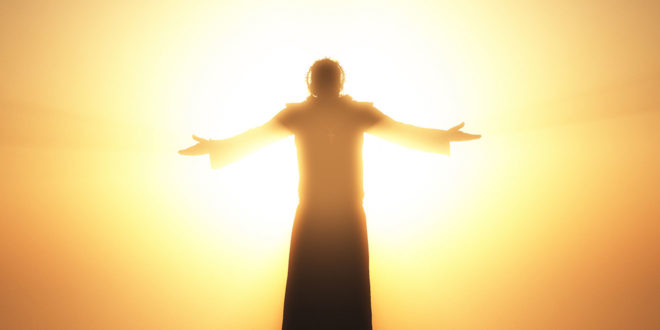In Revelation Michael is a heavenly being of great power and authority. And there was war in heaven. Michael and his angels fought against the dragon [Lucifer] and his angels, and the dragon and his angels fought back. But he was not strong enough, and they lost their place in heaven. So Michael is the commander of all the vast heavenly hosts.
In the prophetic book of Daniel we find this heavenly being again, now referred to as “Michael, one of the chief princes,” and “Michael, your prince.” Then in the concluding chapter of Daniel, he begins: At that time, Michael, the great prince who protects your people will arise.
Probably the most enigmatic reference is in the small book of Jude, which comes right before Revelation. In verse 9, the brother of James writes: Even the archangel Michael, when he was disputing with the devil about the body of Moses, did not dare to bring a slanderous accusation against him, but said, “The Lord rebuke you!”
What Is an Archangel?
This leads to a pivotal question, then; what is an archangel? The Bible suggests that at one point both Lucifer and Gabriel were the leading angels in the heavenly order (Isaiah 14, Luke 1:19), but only Michael is ever referred to as an archangel. The only other use of that word is in I Thessalonians 4:16, the glorious resurrection passage: For the Lord himself will come down from heaven, with a loud command [shout, KJV], with the voice of the archangel and with the trumpet call of God, and the dead in Christ will rise first.
So here is a caveat. It is possible to surmise that this great Michael might actually be Jesus Christ himself . . . if we are clear to emphatically state that Jesus is NOT an angel! Our Savior is God from all eternity, not created, not less than the Father, and definitely not an angel. Is it possible for the archangel to be the leader of the angels, the great divine being they obey and under whose banner they fight — but not be an angel himself?
“Lord” and “Angel of the Lord”
In the Old Testament, writers sometimes interchangeably used “the Lord” and “angel of the Lord.” The Gideon story (Judges 6) tells of the angel of the Lord visiting Gideon. But as they begin to converse, suddenly it is “the Lord.” Hosea 12 describes Jacob wrestling with an angel, while the original story in Genesis 32 tells us it was God himself. In Zechariah 3, the angel of the Lord promises to take away Joshua’s sin—but to blot out sin is something only a divine God can do. In Exodus 21 God promises to send “an angel” ahead of his people Israel, and this being has the power to forgive rebellion, a power reserved for deity alone.
If Michael is actually one of Jesus’ many Bible names, some wonder why in Jude this great archangel would not “dare” to bring a slanderous accusation against Satan. Obviously Jesus is not intimidated by Lucifer, who is a vanquished foe, and the Greek word for “dare,” tolmao, carries a meaning of “fear of retaliation.” One commentator observes, though: “He yet dared not to utter any reviling expression: not from fear of the devil. But because even in those circumstances, it was not have been consistent with the perfection of his character.”
Whatever conclusion a student comes to, we should be warned of embracing the error made by the Jehovah’s Witnesses group: that of making Christ/Michael a created being, less than God the Father. In their literature, they state: “[Christ] was a god, but not the almighty God who is Jehovah.” The full and complete and eternal deity of our Lord Jesus is a hallmark of secure Christianity, and a truth we should never sacrifice over a disputable point like this one.
If you enjoyed this, you may also enjoy An Unlikely Angel
© 2002 - 2024, AnswersForMe.org. All rights reserved. Click here for content usage information. Answers for Me Support & encouragement for every-day life
Answers for Me Support & encouragement for every-day life



